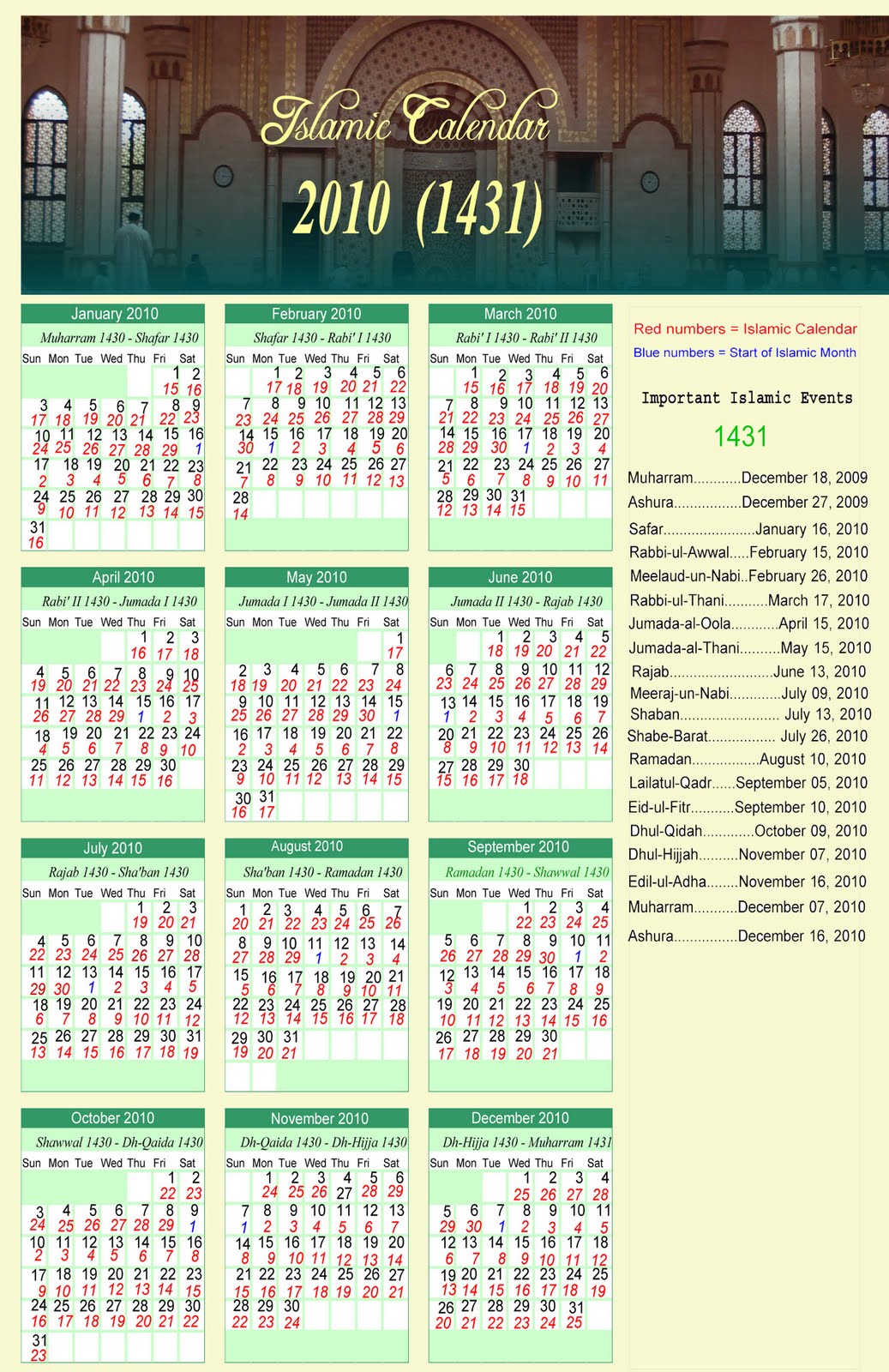

The first day of the week is Sunday, which is called youm (day) al-ahad (the first). youm al-arba`a’ (fourth day) - Wednesday.youm ath-thalatha’ (third day) - Tuesday.The following is the list of the days of the week used specifically by Arabs and in Islamic nations in general. The names of the days of the week in the Arab or Muslim calendar have obvious origins from Jewish and Christian influence in Arabia. The Jewish calendar was specifically based on the lunar cycle. In the Bible it is written that God said, “Let there be lights in the expanse of the heavens to separate the day from the night, and let them be for signs and for seasons and for days and years” (Gen 1:16). Western urban dwellers hardly relate to the possibility of using the moon as a calendar reference, yet for many peoples around the world, the lunar cycle is still the prevailing way of following and calculating time. The Ramadan month will therefore shift each year until eventually (after 33 years) it will have cycled through a whole (Gregorian) year. The Muslim calendar year is 354 days long and “lags behind” each year by 11 days compared to the Western “Gregorian” Calendar. Your browser does not support the audio element.This month of Ramadan is determined by the Muslim lunar calendar (corresponding to the lunar cycle from one crescent moon to the next). Listen to a recorded reading of this page:.Take a ten question quiz about this page.The word "Eid" means "festival." It is sometimes spelled "Id.".Muslims often read the entire Quran during the month of Ramadan.At the end of Ramadan, Muslims make a charitable gift called the "Zakat" to help poor people.Young children, sick people, and pregnant women can be excused. Not all Muslims are required to fast during Ramadan.Some Muslim countries, like Saudi Arabia, use the Islamic calendar as their official calendar.Interesting Facts about the Islamic Calendar, Holidays, and Festivals Celebrations include family gatherings, meals, animal sacrifice for food, and giving gifts. The festival commemorates how Ibrahim (Abraham) was willing to sacrifice his son Isaac at God's command. It begins on the 10th day of Dhu al-Hijjah and ends on the 13th day. Eid al-Adha - This is perhaps the most important festival on the Islamic calendar.Muslim families often get together for meals and to exchange presents. It is celebrated on the 1st day of the month of Shawwal. Eid al-Fitr - This day marks the end of Ramadan and is sometimes called the Breaking of the Fast.It takes place near the end of Ramadan and commemorates the night the Quran was first given to Muhammad. Laylat al-Qadr - This day is also called the Night of Power.Throughout the month of Ramadan, Muslims fast (don't eat or drink) from sunrise to sunset. It is special to Muslims because it is the month when the Quran was revealed to Muhammad. Ramadan - Ramadan is the ninth month in the Islamic calendar.This day is often celebrated with parades and songs. Mawlid an Nabi - This day celebrates the birth of Muhammad and takes place on the 12th day of Rabi al-Awwal.Ashura - This holiday is a day of fasting that takes place on the 10th of Muharram.This holiday is sometimes known as just "Muharram." Muslims generally spend the day quietly in reflection and prayer. It marks the day when Muhammad and his followers traveled from Mecca to Medina.


Al Hijrah - Al Hijrah celebrates the Islamic New Year and takes place on the first day of the month of Muharram.The two most important festivals are Eid Al-Fitr and Eid Al-Adha. There are several days set aside as holidays to celebrate or reflect on certain events in the history of Islam. Religious holidays and festivals are important times in the lives of Muslims. This migration is called the "Hijrah." The Islamic year is then given as AH, which means "after the Hijrah." The first year of the Islamic calendar began in 622 CE when the Prophet Muhammad and his followers migrated from Mecca to Medina. Because the Islamic calendar has fewer days (typically 11 fewer), Islamic holidays and festivals move each year when compared to the western calendar. As a result, the Islamic year has either 354 or 355 days. The 12 months in the Islamic calendar are based on the moon and have 29 or 30 days. The Islamic Calendar is different than the Gregorian calendar (the calendar used by the western world). Early Islamic World Calendar, Holidays, and Festivals History for Kids > Early Islamic World


 0 kommentar(er)
0 kommentar(er)
